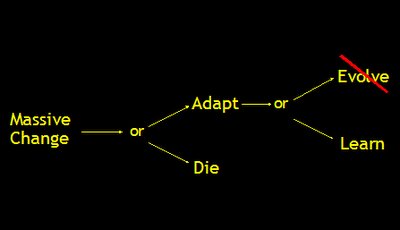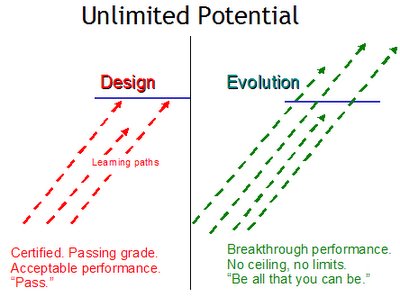Tuesday, December 13, 2005
This morning I delivered a half-hour presentation on Natural Learning to the Finnish eLearning RoundTable. It's a balmy 32° F in Helsinki at the moment. Thank goodness for Macromedia Breeze and Skype, for they enabled me to take part from my office in Berkeley.
I'm finding that people can buy my definition of learning as adapation.
They understand the logic of learning without boundaries.
The question I hear again and again is "How can we assess the quality of informal learning?" My response is two-fold:
I'm finding that people can buy my definition of learning as adapation.
They understand the logic of learning without boundaries.
The question I hear again and again is "How can we assess the quality of informal learning?" My response is two-fold:
- How can you assess the quality of formal learning?
- The measure of success is how well workers get the job done.











1 Comments:
Dear Jay, I have enjoyed watching your presentation. Most of what you present is very common to us. I really enjoyed your comment about the neglicting the importance of conversation. It is something that we value very much as one of the main sources of learning, especially creative learning ... natural leaning, unlimited learning, whatever name you want to give it. What I miss in your presentation is the imporance of play! Challenging ourselves, creating new concepts, ideas is nothing else but play! We don't see it that way anymore, because we were taught once that play is something unusefull, something you only do in spare time. In my opinion play is essential, not only for us to recognise that the moment you feel happy at work, happy at home, happy in converations, you are actually playing!
So now for the question, I noticed in your slide about a learners life cycle, that you assume a curve from more formal instruction into the mature state of informal learning. In the same time, in the beginning of your presentation, you tell that informal learning is more favourable, more effective and more productive! So why do you state, in a time that is changing so rapidly, that the novice learner is still in a formal state as it seems unquestioned? Isn't it logical that if we want to cope with the changing times (and not die!) we have to change the environment in which novices start in our companies! Not as formal learners, but already as informal mature learners.
I am involved in a new school in the Netherlands, that has its concepts and ideas from the Sudbury Valley School in the US. These schools create an environment in which childern can set their own curriculum and in which most of the time, informal learning takes place. Formal learning can happen on request of the students, and because of their own motivation, will have a much more effective result. (No sleeping on the bus!). Our goal is to give childern the full responsibility of their lives, in a very strong social structure, which is set by the democratic environment of the school. If you are interested, we surely want to tell you more about it.
Thanks for your inpsiration.
Post a Comment
<< Home